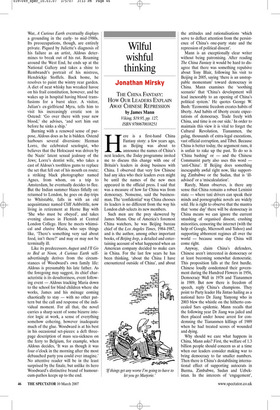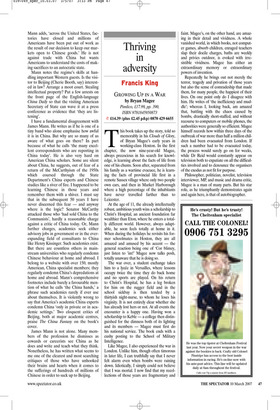Wilful wishful thinking
Jonathan Mirsky
THE CHINA FANTASY: HOW OUR LEADERS EXPLAIN AWAY CHINESE REPRESSION by James Mann Viking, $19.95, pp. 127, ISBN 9780670038251 Here is a first-hand China Fantasy story: a few years ago, as Beijing was about to announce the names of China’s next leaders, the Today programme invited me to discuss this change with one of Britain’s leaders in doing business with China. I observed that very few Chinese had any idea who their leaders even might be until the names of the new men appeared in the official press. I said that was a measure of how far China was from democracy. Nonsense, said the businessman. The ‘confidential’ way China chooses its leaders is no different from the way his London club selects its new members.
Such men are the prey skewered by James Mann. One of America’s foremost China watchers, he was Beijing bureau chief of the Los Angeles Times, 1984-1987, and is the author, among other important books, of Beijing Jeep, a detailed and entertaining account of what happened when an American company decided to make cars in China. For the last few years he has been thinking, ‘about the China I have encountered outside of China’, and about the attitudes and rationalisations ‘which serve to deflect attention from the persistence of China’s one-party state and the repression of political dissent’.
Mann is an exceptionally clear writer without being patronising. After reading The China Fantasy it would be hard to disagree that there was something repulsive about Tony Blair, following his visit to Beijing in 2005, saying ‘there is an unstoppable momentum’ toward democracy in China. Mann examines the ‘soothing scenario’ that ‘China’s development will lead inexorably to an opening of China’s political system.’ He quotes George W. Bush: ‘Economic freedom creates habits of liberty. And habits of liberty create expectations of democracy. Trade freely with China, and time is on our side.’ In order to maintain this view it is vital to forget the Cultural Revolution, Tiananmen, the gulag, thousands of extra-legal executions, vast official corruption, and Tibet. Because China is better today, the argument runs, it is unfair to rake up the past. To do so is ‘China bashing’ or — and the Chinese Communist party also uses this word — ‘anti-China’. If Beijing does something inescapably awful right now, like supporting Zimbabwe or the Sudan, that is ‘illadvised’ or a ‘miscalculation’.
Rarely, Mann observes, is there any sense that China remains a robust Leninist state — where taxi drivers can speak their minds and pornographic novels are widely sold. He is right to observe that the mantra that ‘some day’ there will be democracy in China means we can ignore the current smashing of organised dissent, crushing minorities, censoring the internet (with the help of Google, Microsoft and Yahoo) and supporting abhorrent regimes all over the world — because some day China will come right.
Anyway, claim China’s defenders, Chinese aren’t interested in democracy or at least becoming somewhat democratic. This proposition falls at the first hurdle. Chinese loudly condemned their government during the Hundred Flowers in 1956, Democracy Wall in 1978 and Tiananmen in 1989. But now there is freedom of speech, reply China’s champions. They point to Party leader Hu Jintao hailing as a national hero Dr Jiang Yanyong who in 2003 blew the whistle on the hitherto concealed Sars epidemic. Mann recalls that the following year Dr Jiang was jailed and then placed under house arrest for condemning the Tiananmen killings of 1989 when he had treated scores of wounded and dying.
Why should we care what happens in China, Mann asks? First, the welfare of 1.3 billion people should concern us at a time when our leaders consider making war to bring democracy to far smaller numbers. Then there is China’s destabilising international effect of supporting autocrats in Burma, Zimbabwe, Sudan and Uzbekistan. In the interests of ‘engagement’, Mann adds, ‘across the United States, factories have closed and millions of Americans have been put out of work as the result of our decision to keep our markets open to Chinese goods.’ He is not against trade with China but wants Americans to understand the costs of making sacrifices to an autocratic state.
Mann notes the regime’s skills at handling important Western guests. Is the visitor to Beijing (Cherie Booth, say) interested in law? Arrange a moot court. Stealing intellectual property? Put a few arrests on the front page of the English-language China Daily so that the visiting American Secretary of State can wave it at a press conference as evidence that ‘they are listening’.
I have a fundamental disagreement with James Mann. He writes as if he is one of a tiny band who alone emphasise how awful it is in China. But why are so many of us aware of what goes on there? In part because of what he calls ‘the many excellent correspondents who are reporting in China today’. He is also very hard on American China scholars. Some are silent about China, he suggests, out of fear of a return of the McCarthyism of the 1950s which coursed through the State Department’s China experts and Chinese studies like a river of fire. I happened to be learning Chinese in those years and remember them with a shiver. I must say that in the subsequent 50 years I have never discerned this fear — and anyway where is the logic? Senator McCarthy attacked those who ‘had sold China to the Communists’, hardly a reasonable charge against a critic of China today. Or, Mann further charges, academics seek either advisory jobs in government or in the everexpanding field of consultants to China like Henry Kissinger. Such academics exist. But there are countless others in mainstream universities who regularly condemn Chinese behaviour at home and abroad. I belong to a website with over 150, mostly American, China specialist members; they regularly condemn China’s depredations at home and abroad. Mann’s comprehensive footnotes include barely a favourable mention of what he calls ‘the China hands,’ a phrase such academics rarely if ever use about themselves. It is violently wrong to say that America’s academic China experts condemn China ‘only in private or in academic settings.’ Two eloquent critics of Beijing, both at major academic centres, praise The China Fantasy on the book’s cover.
James Mann is not alone. Many members of the profession he dismisses as cowards or careerists see China as he does and write and teach what they think. Nonetheless, he has written what seems to me one of the clearest and most searching critiques of those who have unhooked their brains and hearts when it comes to the sufferings of hundreds of millions of Chinese in order to suck up to Beijing.



























































































 Previous page
Previous page